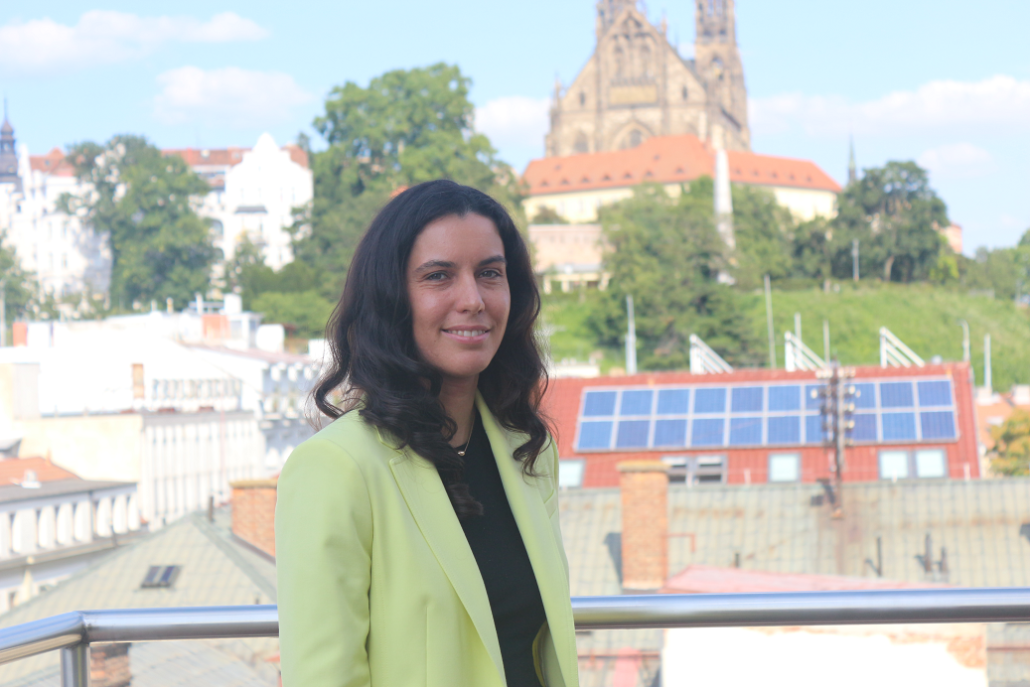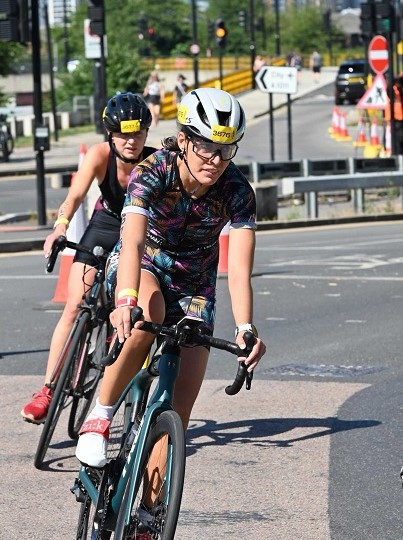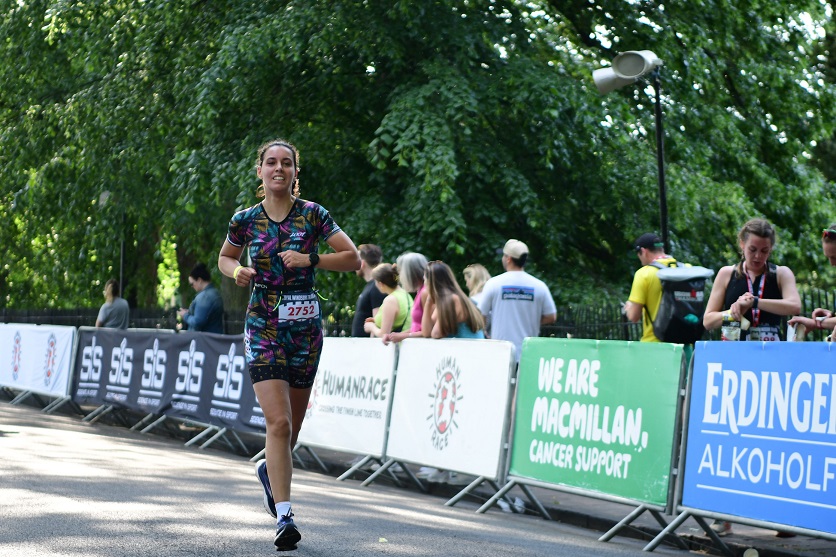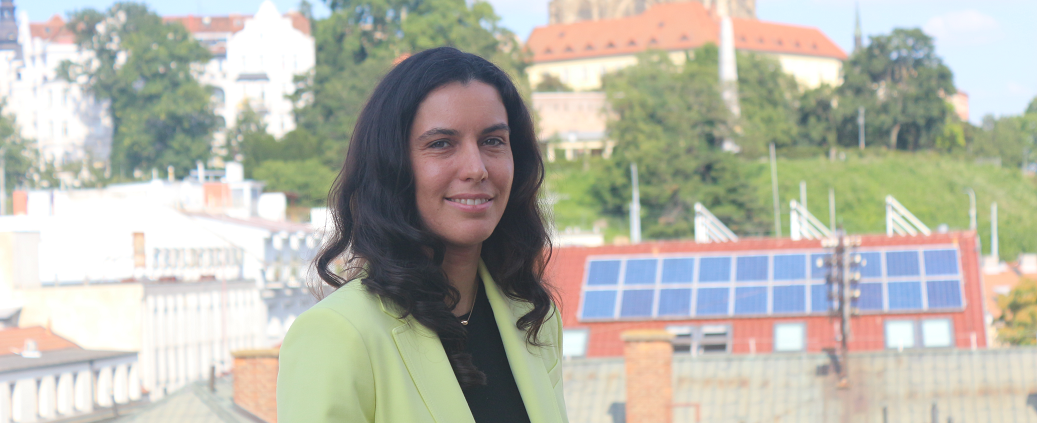“The worst is the helplessness,” says Czech triathlete Iva Horčicová about Alzheimer’s and Parkinson’s. She decided to support their research through the race
Brno native Iva Horčicová is competing for the first time in her age category at the amateur Triathlon World Championship this year. She is also combining her challenging race with a good cause. She is organizing a fundraiser, the proceeds of which she would like to donate to the Brno National Institute for Neurological Research to combat neurodegenerative diseases.

You come from Brno but live in London. What brought you to Britain?
My journey first took me to Prague, where I studied. However, I wanted to go abroad for my second master’s degree, so I applied to the Institute for Law and Finance in Frankfurt. I then received a job offer in Munich, and they sent me on assignment for three months in London… And I’ve been here for eleven years now!
How did you get into triathlon? Have you been racing since you were a child?
Not at all! I’ve been active my whole life, but I only started triathlon last year. It was on New Year’s Day; our group of friends was brainstorming what new things we could try this year, and the idea of participating in a triathlon came up. Well, as it usually happens, in the end, only my boyfriend and I from the whole group participated. (laughs) I got really hooked on it; it’s a combination of three different sports, so you engage your whole body. And so we signed up for another one, and then another… The triathlon season in England lasts until the end of October, so I was thinking about some motivation for proper training even through the winter. And then the idea of the world championship struck me!
What result do you expect from the championship?
My goal is not to be last. It seems like a very easy target, but when you realize that other competitors have been doing triathlon for ten years… I want to prove to myself what can be achieved through regular training. I’ve created quite a strict regime; I wake up at six and go work out, and I look forward to it every day! I feel much better all day afterward.
You thought about connecting your race with a good cause—the proceeds from the event will go to the research in National Institute for Neurological Research. Why did you choose to support research into neurodegenerative diseases?
I have two reasons—first, it’s a topic that unfortunately affects my family a lot. My grandfather has Alzheimer’s disease, and my grandmother is currently battling Parkinson’s. Secondly, I feel that not enough is known about these diseases. Their prevalence is constantly rising… We will encounter them more and more often, and I see great significance in supporting research, diagnostics, and, last but not least, raising awareness about these issues. I simply want to help in an area that society isn’t focusing enough attention on, in my opinion.
Currently, there are about 150,000 people in the Czech Republic with Alzheimer’s or Parkinson’s disease, and predictions state that by 2034, their number will double. This will put a burden not only on the healthcare system but also on the social system, as there will be a need to care for and support the sick…
Exactly. The problem could be bigger in the future than we think… And especially the younger generation probably isn’t fully aware of this threat yet.
What has been the most difficult aspect for you personally regarding your grandparents’ illnesses?
The hardest part is, and still is, that you really don’t know how you can help. Since these diseases are incurable, all you can do is try to ease their daily lives as much as possible. It’s emotionally challenging because there is no universal help.
When did you first notice that something was wrong with your grandparents? At what moment did you think it could be symptoms of a neurodegenerative disease?
My grandfather’s Alzheimer’s developed quite quickly. I remember driving him home from a celebration, and there was nothing unusual about his behavior at that time, but a few months later, hospitalization in a psychiatric facility became necessary. Some signs were already there earlier, and the disease had certainly been developing for many years, but you only realize that in hindsight. It’s hard to distinguish what to attribute to aging and what are symptoms of Alzheimer’s. In my grandmother’s case, it took a relatively long time to find out. The doctors were uncertain for a long time whether it was Parkinson’s or not. She had tremors in her hands; there were signs, but they weren’t entirely clear. It seems to me that Parkinson’s disease developed more gradually, while my grandfather’s Alzheimer’s declined very rapidly… But it’s definitely individual.


Iva during her training
How neurodegenerative diseases are diagnosed is a major topic of scientific research; after all, our National Institute for Neurological Research is also involved in it… What do you think would help such a patient the most? What is your experience?
When you learn of your relative’s diagnosis, you naturally try to gather as much information as possible about the disease. But the most important thing is to be close to that person and support them emotionally. The sick person goes through various stages and isn’t always in a good mood; they don’t always behave as we’re used to, and they’re not always the person we knew… And we can’t influence that. Patience, resilience, and support from loved ones are extremely important. I see this now with my grandmother—even though I’m not there every day. My mom and uncle care for her daily, which unfortunately isn’t possible for me… But whenever I’m with her, I feel that she’s happier. She enjoys having someone there to talk to. I often call her; she’s happy when I send her pictures, for example. For us, these are small things, but for the sick person, they are significant. They can no longer do much on their own, and that contact is important for them.
What would you advise people whose relative has just received a similar diagnosis?
Find out as much information as possible and try to help with everyday matters. Think about how to make life easier for them. For example, my grandmother has difficulty getting up and walking, so we got her a walker and a special bed. Ensuring daily functioning so that a person can remain in their home environment for as long as possible… And then… To be honest, it’s hard to give further advice.
Have your grandparents’ illnesses influenced your approach to your health?
Absolutely. You see that health is the most important thing. Without it, it’s hard to do what you love and fulfill your dreams… I no longer stress about everyday issues as much; I have a broader perspective on life. And sports have always been a part of my life. But now I’m more interested in what type of sport; I’m trying to educate myself in this area. As you age, you need a slightly different type of movement, especially women; it’s important for us to build as much muscle mass as possible, which we start to lose slowly after thirty and even faster after fifty if we don’t exercise or engage in physical work. This can lead to a situation where, in old age, we’re unable to lift relatively light things, like a grocery bag or a laundry basket. I’m also interested in how to best prepare my body for aging. I’m trying to pay attention to nutrition as well. Don’t imagine any extremes or diets; it’s about avoiding processed foods, buying fresh items, eating enough protein, and maintaining a balanced diet, which has a significant impact. My grandparents’ illnesses have prompted me to focus more on ensuring my body functions well even in later years. It’s incredibly sad to see when the body or mind no longer works, when a person can hardly do anything… When they may still be alive, but how… You find yourself asking what you can do to avoid reaching that stage or, if you do, to do so as late as possible. There is, of course, no one reliable recipe for this, but we can try to keep our bodies in the best condition possible.
Where can we follow your training progress?
I will regularly share my progress on Instagram, posting a photo or video from training every day so everyone can see how I’m suffering (laughs). And anyone who wants can join me for a run sometime! I’ll be training in London, where I live. From time to time, I’ll also be in Prague or Brno, so if anyone wants to join, they can come and try what training for a triathlon championship involves.
Martina Jelínková
martina.jelinkova@fnusa.cz




